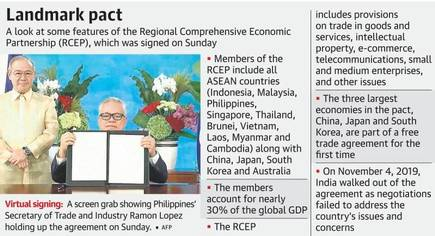Recently, the Regional Comprehensive Economic Partnership (RCEP) was signed into existence by 15 countries led by China, Japan, South Korea, Australia, New Zealand and the 10-state ASEAN grouping, creating one of the world’s largest trading blocs.
India had been a part of negotiations for almost nine years till it pulled out in November 2019, stating that inadequate safeguards and lowering of customs duties will adversely impact its manufacturing, agriculture and dairy sectors.
However, by staying out, India has blocked itself from a trade bloc that represents 30% of the global economy and world population, touching over 2.2 billion people.
Further, as the summary of the final agreement shows that the pact does cover and attempt to address some issues that India had flagged, including rules of origin, trade in services, movement of persons. Therefore, this makes the case of India to review its decision and look RCEP through the lens of economic realism.
Reasons for India's Withdrawal
- Unfavourable Balance of Trade: Though trade has increased the post-Free Trade Agreement with South Korea, ASEAN countries and Japan, imports have risen faster than exports from India.
- According to a paper published by NITI Aayog, India has a bilateral trade deficit with most of the member countries of RCEP.
- Chinese Angle: India has already signed FTA with all the countries of RCEP except China. Trade data suggests that India’s deficit with China, with which it does not have a trade pact, is higher than that of the remaining RCEP constituents put together.
- This trade deficit is the primary concern for India, as after signing RCEP cheaper products from China would have flooded the Indian market.
- Further, from a geopolitical perspective, RCEP is China-led or is intended to expand China's influence in Asia.
- Non-acceptance of Auto-trigger Mechanism: To deal with the imminent rise in imports, India had been seeking an auto-trigger mechanism.
- Auto-trigger Mechanism would have allowed India to raise tariffs on products in instances where imports cross a certain threshold.
- However, other countries in the RCEP were against this proposal.
- Protection of Domestic Industry: India had also reportedly expressed apprehensions on lowering and eliminating tariffs on several products like dairy, steel etc.
- For instance, the dairy industry is expected to face stiff competition from Australia and New Zealand.
- Currently, India’s average bound tariff for dairy products is on average 35%.
- The RCEP binds countries to reduce that current level of tariffs to zero within the next 15 years.
- Lack of Consensus on Rules of Origin: India was concerned about a “possible circumvention” of rules of origin.
- Rules of origin are the criteria used to determine the national source of a product.
- Current provisions in the deal reportedly do not prevent countries from routing, through other countries, products on which India would maintain higher tariffs.
Reasons For India to Review
- Global Economic Stagnation due to Covid-19: With global trade and the economy facing a steep decline due to Covid-19 pandemic, RCEP can serve as a bulwark in containing the free fall of the global economy and re-energising economic activity.
- Further, the RCEP presents a unique opportunity to support India’s economic recovery, inclusive development and job creation even as it helps strengthen regional supply chains.
- Need For Economic Realism: India should deter seeing RCEP only from the Chinese perspective.
- India should acknowledge that the trade bloc represents 30% of the global economy and world population, touching over 2.2 billion people, and staying out of RCEP may result in suboptimal economic growth without leveraging Asia-Pacific demand.
- In this regard, India can draw inspiration from Japan & Australia, as they chose to bury their geopolitical differences with China to prioritise what they collectively see as a mutually beneficial trading compact.
- Strategic Need: It is not just because gains from trade are significant, but the RCEP’s membership is a prerequisite to having a say in shaping RCEP’s rules.
- This is necessary to safeguard India’s interests and the interests of several countries that are too small to stand up to the largest member, China.
- Moreover, staying out of RCEP may also affect India's Act East policy.
Conclusion
Acknowledging India’s economic heft and value as a market, the RCEP members have left the door open for India for inviting it to be an observer member and also waived a critical 18-month cooling period for interested applicants.
Given the global economic scenario in present times and the near future, it would be in India’s interest to dispassionately review its position on RCEP and carry out structural reforms that will help India to mitigate some of the repercussions arising from the RCEP.

we are here to make your civil services journey more focused and less time consume we are here to provide free education and quality education to all we will post weekly compenduim of the all the current affairs and the best articles from the indian express and the hindu so do like and subscribe to our plzz support us
ReplyDelete